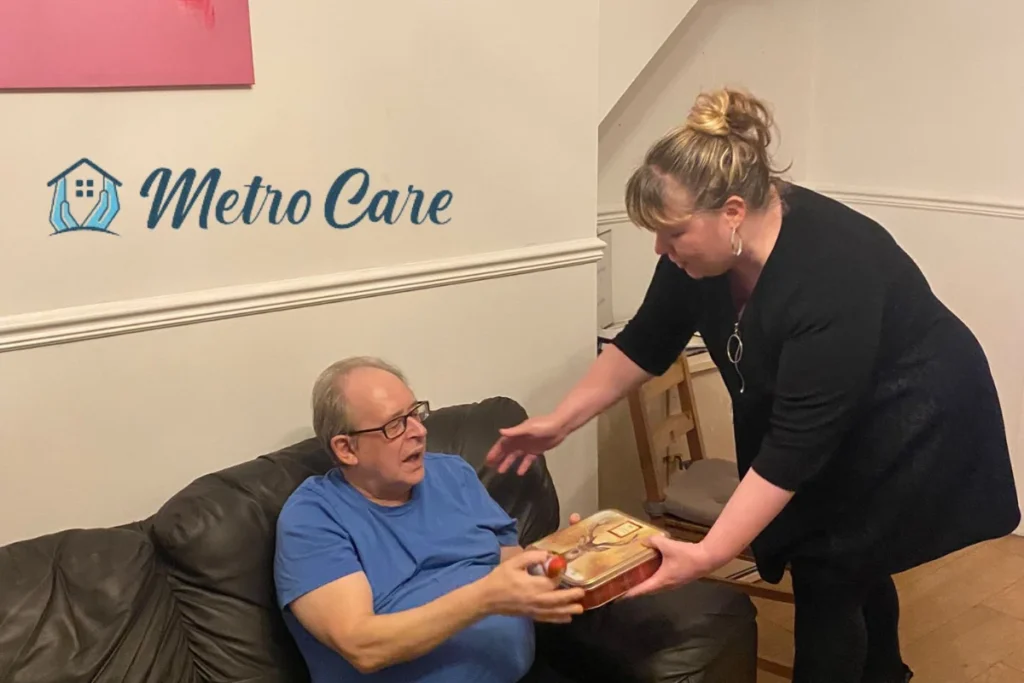Supported living for adults with learning disabilities is a care model that allows individuals to live independently with personalized support. It assists with daily tasks, emotional well-being, and social engagement.
This option is ideal for those who want autonomy but still need help to maintain a safe and fulfilling life.
Table of Contents
What is Supported Living?
Supported living is a service that helps adults with learning disabilities live independently while receiving help with their daily tasks.
In this setup, individuals have their own homes and control over their lives. Unlike in care homes, supported living keeps housing separate from care services.
This allows people to change their support providers without the stress of moving to a new place. Residents sign their own tenancy agreements, giving them more control over where they live, while still having access to assistance with household chores, personal care, and community activities.
This approach gives individuals a sense of stability and autonomy. They can remain in their own homes, manage their living expenses, and adjust the level of care based on their changing needs.
Whether it’s a few hours of support each week or more extensive help, supported living care services offers flexibility that can make a real difference in their quality of life.
Signs of Learning Disability in Adults
Who is Supported Living Suitable For?

Supported living is ideal for adults with learning disabilities who:
- Want to live independently but need some assistance.
- Require help with daily activities like personal care, cooking, and cleaning.
- Have cognitive or behavioral challenges that need support.
- Prefer to live in their own home or shared accommodation.
- Need assistance managing finances and social engagements.
- Benefit from ongoing support without the need for full-time residential care.
Is a care home cheaper than a nursing home?
Key Benefits of Daily Living Assistance for Disabled Adults
Promoting Independence and Personal Growth in Supported Living

Supported living helps adults with learning disabilities gain independence while offering daily living assistance. Individuals can take charge of their daily lives with varying levels of support, depending on their needs. This model allows residents to:
- Develop key life skills like cooking and budgeting
- Manage personal care with guidance
- Gain more control over daily routines and activities
- Pursue personal goals in a supportive environment
The support workers offer help while encouraging individuals to grow at their own pace. As people develop their skills, they gain greater control over their lives, promoting long-term independence
Cognitive and Behavioral Support in Supported Living
Supported living also offers cognitive and behavioral support. Each person receives individualized disability care that suits their specific challenges. The support includes:
- Learn coping strategies for managing emotional challenges
- Improve social interactions and communication skills
- Develop emotional resilience and better mental well-being
This overall support-system helps individuals better manage their daily lives, improving mental health and promoting more stable, productive interactions with others.
Social Support for Adults with Disabilities

Disability care services are a vital part of supported living. Many adults with disabilities benefit from regular social interaction and community engagement. Key social benefits include:
- Opportunities to participate in community activities and group outings.
- Building friendships and staying socially active.
- Structured support for maintaining relationships.
Adult social care for disabilities creates an environment where individuals can continue to grow socially, contributing to better emotional well-being and a strong sense of belonging.
Supported Living vs. Residential Care: A Simple Comparison
Choosing between supported living and residential care depends on the level of support needed. Here’s a quick breakdown:
| Aspect | Supported Living | Residential Care |
| Independence | People live in their own homes and handle daily tasks with some support. | Full-time care in a managed facility, suited for those needing constant help. |
| Living Setup | Individuals live in their own home or shared space, managing routines. | Care is provided in a facility where staff manage meals, care, and daily routines. |
| Costs | People cover personal expenses (bills, groceries, activities). They may get help from benefits like Housing Benefit or PIP. | All costs (care, food, activities) are usually included, making expenses more predictable. |
| Care | Care is flexible and based on individual needs, encouraging more independence. | Structured, 24/7 care for those with complex needs who need constant assistance. |
| Family Role | Families may help manage finances and care plans. | Families are less involved in day-to-day decisions as care is handled by the facility. |
| Social Life | Individuals join community activities and maintain independence. | Activities are usually arranged within the care home, with less community involvement. |
Services Provided in Supported Living for Adults with Learning Disabilities

In supported living, adults with learning disabilities receive a wide range of services aimed at promoting both independence and a better quality of life.
These services help individuals manage daily tasks and provide them with the support they need to live comfortably in their own homes. Here’s a list of key services offered:
- Personal care assistance
- Meal planning and preparation
- Household chores
- Medication management
- Community involvement
- Money management
- Skill development
- Access to education, employment, or volunteering
- Home care services for learning disabilities
These services are adaptable to the needs of each individual, whether they require minimal support or more comprehensive assistance. By offering such diverse support, supported living helps adults with learning disabilities lead fulfilling lives while staying engaged with their communities.
Check out our FAQs about Supported Living for Adults.
Supported Living Care in London: What You Need to Know
Metro Care UK offers a range of services for adults with learning disabilities all over London, as well as Essex. Local providers work with individuals to meet their unique needs, helping them live independently in the community. Services typically include:
- Help with daily tasks,
- Personal care, and
- Access to community programs.
In London, supported living care services are widely accessible, and residents can benefit from both private and publicly funded options depending on eligibility.
Transitioning to Supported Living: Steps for Success
How to Transition from a Care Home to Supported Living
Moving from a care home to supported living is a significant step that involves careful planning and collaboration. Here are some practical steps to make the transition smoother:
- Assess Individual Needs: Start by evaluating the level of support required. This involves working closely with healthcare providers to identify what type of daily living assistance or personal care is needed. Whether it’s help with mobility, managing medications, or personal tasks, understanding these needs will guide the next steps.
- Engage with Support Providers: It’s essential to connect with the new supported living care team early on. Take time to meet the staff, understand their roles, and communicate any specific needs or concerns. This ensures the support plan is tailored to the individual’s preferences.
- Visit Potential Homes: Arrange visits to potential supported living homes. It’s helpful for the individual to see the living environment, meet fellow residents, and become familiar with the surroundings. This step helps ease any anxiety about the move.
- Create a Transition Plan: Work together with caregivers and family to create a step-by-step transition plan. This might include moving personal belongings, setting up the new living space, and gradually adjusting to new routines
- Stay Involved: Family members should remain involved throughout the process, attending meetings, and staying informed about the individual’s progress. Their ongoing support can make the transition much more comfortable
Addressing Concerns During the Transition to Supported Living
It’s natural for families and individuals to have concerns about transitioning to supported living. Here are some common worries and ways to address them:
- Fear of Isolation: Moving away from a care home environment can feel daunting, but supported living often offers more social opportunities. Many homes are integrated into the community, and support workers actively encourage social engagement and participation in activities. Encourage regular visits from friends and family to maintain connections.
- Adjusting to New Routines: Change can be overwhelming, but introducing new routines gradually can help ease the adjustment. Encourage individuals to take ownership of their schedules, from meal times to daily activities, making the new environment feel more like home
- Concerns About Safety: Families may worry about the safety of their loved ones in a less structured environment. However, supported living offers various levels of supervision, and care providers are on hand to assist with personal maintenance, medication, and other needs. Discuss safety measures with the care team to ease any concerns
- Uncertainty About the Future: Transitioning is a big step, and families might worry about long-term stability. Open communication with the supported living provider can help address these fears, as they often have protocols in place to support long-term living arrangements
This transition is a journey, but with the right support and preparation, it can lead to a more independent and fulfilling life for adults with learning disabilities.
How is Supported Living Funded or Paid For?
Supported living in the UK is typically funded through a combination of government benefits and local authority support. Here are the main funding sources:
- Government Benefits: Assistance like housing benefits helps cover rent and living expenses.
- Local Authority Contributions: Financial support based on individual assessments and needs. Learn more from the NHS guide.
- Personal Budgets: Individuals may receive personal budgets and direct payments to manage their own care and choose the services that best suit their needs.
- NHS Continuing Healthcare: Available for those with more complex health and care needs (read more).
- Disability Benefits: Includes Universal Credit, Personal Independence Payments (PIP), and Employment and Support Allowance (ESA) to assist with living costs.
How Metro Care UK Can Help?
Supported living for adults with learning disabilities provides the essential balance of independence and care, empowering individuals to lead fulfilling lives. With Metro Care UK, residents receive:
- Independence: Individuals live in their own homes, managing personal routines like cooking, cleaning, and daily activities
- Flexible Support: Care is flexible and designed to meet each person’s unique needs, ranging from help with personal assistance to managing health appointments
- Community Engagement: Encourages social connections and participation in community activities, fostering a sense of belonging
- Skill Development: Offers opportunities to develop essential life skills such as budgeting, meal preparation, and household management
If you or a loved one is considering supported living, Metro Care UK can help. Our dedicated team offers comprehensive supported living care services across London and Essex, providing the right balance of freedom and assistance. Contact Metro Care UK today to discuss how we can help your loved one grow while living independently with the support they need.
FAQs About Supported Living Care in London
How is Supported Living Funded in the UK?
In the UK, supported living is typically funded through a combination of government benefits and local authority support. Individuals may receive housing benefits to cover rent and other living costs, while care services can be funded through personal budgets, direct payments, or NHS Continuing Healthcare for those with more complex needs. These benefits may include Universal Credit, Personal Independence Payments (PIP), or Employment and Support Allowance (ESA)
Who qualifies for supported living services?
Supported living is designed for individuals with learning disabilities, autism, mental health conditions, or physical disabilities who are capable of living semi-independently but require assistance with daily tasks. Eligibility is typically determined through an assessment by local authorities, who evaluate the individual’s needs and the level of support required. This model is ideal for people who want more autonomy but still need help with personal care, household chores, or community engagement
How does supported living differ from residential care?
The key difference lies in the level of independence. In supported living, individuals live in their own homes, either alone or with others, and receive flexible support dedicated to their needs. They have control over their daily routines, finances, and household management. On the other hand, residential care provides a more structured environment, with 24/7 care on-site, making it more suitable for individuals with higher or more complex care needs who cannot manage basic tasks on their own
Is Family involvement encouraged in supported living?
Yes, family involvement is strongly encouraged in supported living. Families can participate in care planning, attend meetings, and regularly visit their loved ones. This involvement helps create a stable and supportive environment, where the individual can thrive with the reassurance of continued family support.
Are supported living services tailored to the individual’s needs?
Absolutely. Supported living services are highly flexible and customized. Care providers work with individuals to develop customized care plans that reflect their unique needs and preferences. This can include anything from assistance with personal care to support with social activities or job placements, allowing individuals to live as independently as possible while receiving the care they require

